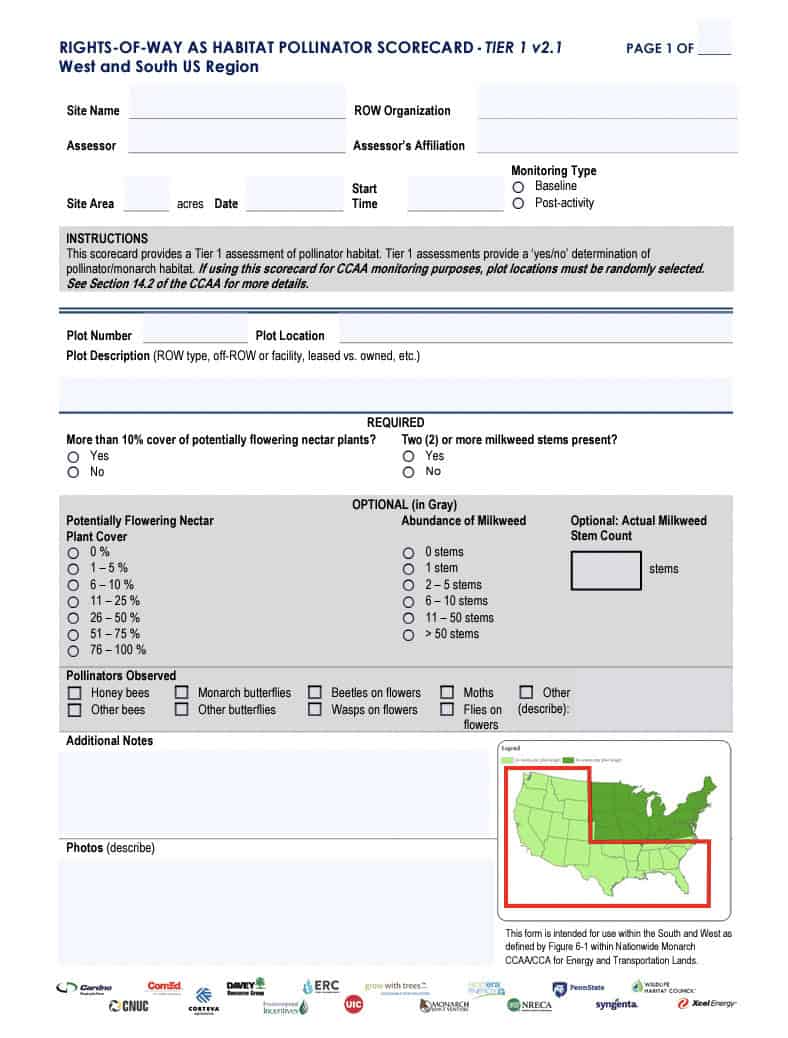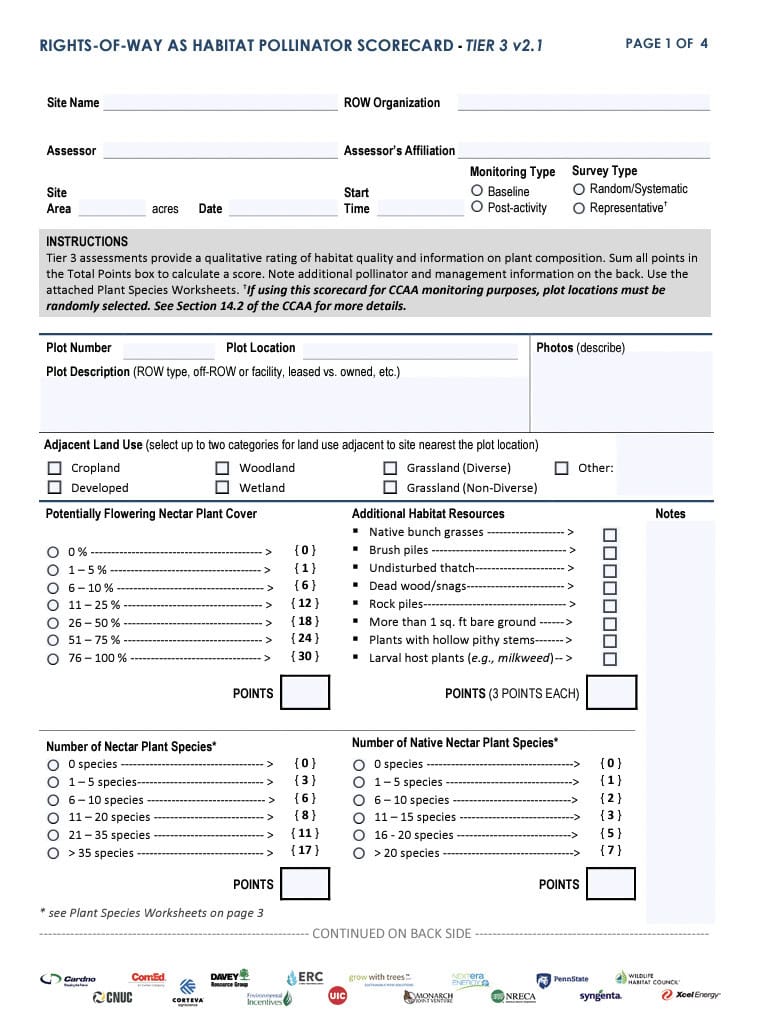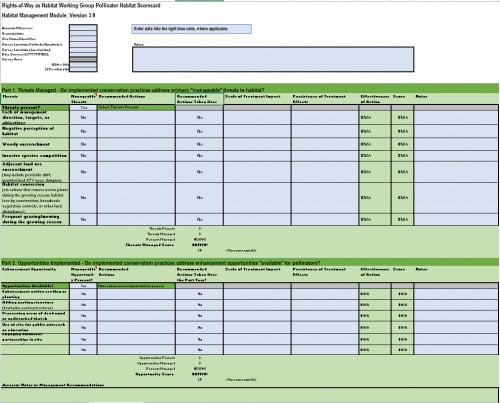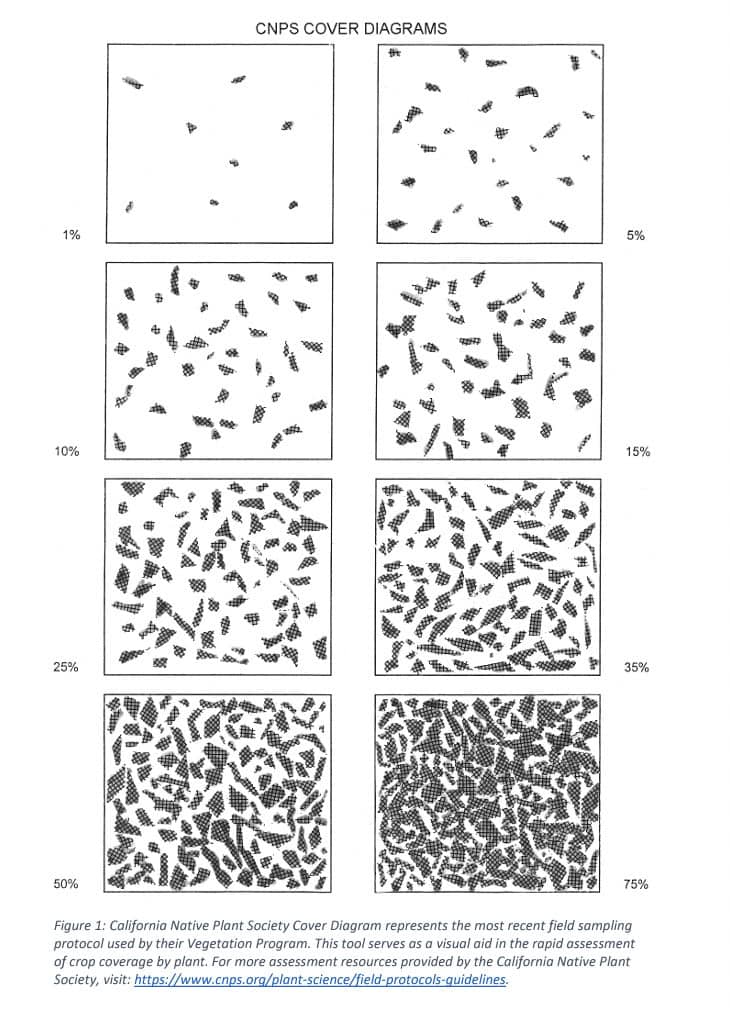-
The Pollinator Scorecard was developed by the Rights-of-Way as Habitat Working Group (ROWHWG) to help energy and transportation rights-of-way (ROW) organizations and land managers evaluate pollinator habitat and management practices. The Pollinator Scorecard User’s Guide provides background information and protocols for using both components of the scorecard: (1) Pollinator Scorecard Management Module and (2) Pollinator Habitat Assessment Protocol (downloads available below). The Pollinator Scorecard aims to:
- Provide a common language to talk about habitat on energy and transportation lands in order to facilitate industry learning and collaboration
- Establish a consistent valuation method across energy and transportation sectors that aligns with existing habitat assessments and reporting
- Provide a flexible, multi-tiered approach that encourages improved monitoring overtime
- Support shared reporting of habitat metrics across industries
Download Links for Assessment Protocol
The Pollinator Scorecard may also be used to meet the monitoring requirements for organizations participating in the monarch butterfly Candidate Conservation Agreement with Assurances (Monarch CCAA),and/or the Geospatial Habitat Database
The Pollinator Habitat Scorecard is made possible with funding from…

And technical expertise from…

-
The Pollinator Scorecard was developed by the Rights-of-Way as Habitat Working Group (ROWHWG) to help energy and transportation rights-of-way (ROW) organizations and land managers evaluate pollinator habitat and management practices. The Pollinator Scorecard User’s Guide provides background information and protocols for using both components of the scorecard: (1) Pollinator Scorecard Management Module and (2) Pollinator Habitat Assessment Protocol.
What is Pollinator Habitat?
For the purposes of the Pollinator Scorecard, pollinator habitat is defined as areas containing native flowering plants, host plants, and nesting sites, throughout the growing season. Other considerations include:
- Pollinator habitat may be remnant natural habitat, habitat enhanced through management, or newly created habitat
- A greater diversity of (or dominance by) native plants, which provides a greater diversity of floral resources, host plants, and nesting sites
- Aim for 3 or more native plant species throughout the spring, summer, and fall

Jason Bleich, Pheasants Forever The Pollinator Scorecard seeks to capture information about the ability and potential of ROW and other energy and transportation lands to support monarch butterfly and other pollinator habitat. Specifically, the Pollinator Scorecard captures information about:
- Abundance of milkweed and flowering plant coverage
- Additional habitat resources
- Adjacent land use
- Pollinators observed
- Threats related to management practices
- Opportunities related to management practices
-
Using the Pollinator Habitat Assessment Protocol
Users may choose between three tiers, from simple to advance monitoring, depending on time availability,expertise, and organization goals.The pollinator Habitat Assessment Protocol is a tool designed for flexibility with an understanding that ROW managers may have different objectives for using the Pollinator Scorecard and varying levels of access to resources and expertise for habitat assessment. All three tiers comply with monitoring requirements for the Monarch CCAA
Determine the best tier for your organizational needs with the following questions:

Tier 1: Is habitat for pollinators present?
- This scorecard is intended for use by anyone, with minimal training or plant identification skills required.
- The scorecard clearly delineates required and optional monitoring fields per the Monarch CCAA.
- Select which Tier 1 scorecard to use based on your location:
Pollinator Habitat Assessment Protocol Tier 1: Midwest/Northeast
Pollinator Habitat Assessment Protocol Tier 1: West/South Region

Tier 2: What is the quality of pollinator habitat?
- This scorecard is intended for use by most assessors.
- Some skill level is required to identify percent plant cover, flowering plants in bloom, habitat resources, and management threats and opportunities.

Tier 3: What is the composition of the pollinator habitat?
- This scorecard is intended for advanced assessors who are capable of identifying most plants to species-level.
Users can also complete the Pollinator Habitat Assessment Protocol electronically through the Survey123 app.The app streamlines data collection and reporting by syncing habitat data and photos with the Rights-of-Way as Habitat Geospatial Database.Find additional information under Resources
-
Using the Pollinator Scorecard Management Module
The Pollinator Scorecard Management Module is used to evaluate the suitability of management activities for pollinator habitat on each plot or site. This tool provides valuable information to consider alongside the habitat quality ratings and may be completed at any time of year following site assessments. The Management Module aims to identify:
- Threats present on the site that may impact the condition (or availability of) habitat
- Opportunities to improve habitat to the benefit of a species
Effectiveness of current and potential management practices are assessed in terms of scale and persistence to generate an overall management score.

Management Module -
Resources  Using the Scorecard
Using the Scorecard Geospatial Database
Geospatial Database Monitoring Plan Guidance
Monitoring Plan Guidance-
Using the Scorecard Pollinator Scorecard User’s Guide

The user guide provides background information and protocols for using both components of the scorecard: (1) Pollinator Scorecard Management Module and (2) Pollinator Habitat Assessment Protocol.
Pollinator Habitat Assessment Protocol Tier 1 Midwest/Northeast

This scorecard is intended for use by anyone, with minimal training or plant identification skills required. The scorecard delineates the required and optional biological effectiveness monitoring fields per the Monarch CCAA.
Pollinator Habitat Assessment Protocol Tier 1 West/South

This scorecard is intended for use by anyone, with minimal training or plant identification skills required. The scorecard delineates the required and optional biological effectiveness monitoring fields per the Monarch CCAA.
Pollinator Habitat Assessment Protocol Tier 2

This scorecard is intended for use by most assessors, but some skill level is required to identify per cent plant cover, flowering plants in bloom, habitat resources, and manage threats and opportunities.
Pollinator Habitat Assessment Protocol Tier 3

This scorecard is intended for advanced assessors who can identify most plants to species level.
-
Geospatial Database 
This reference sheet provides an overview of using ArcGIS Survey123 to collect Pollinator Scorecard data in the field and provides step-by-step instructions for users to follow.
Pollinator Habitat Geospatial Database

The geospatial database allows your organization to store and track information about habitat restoration projects and conservation measures on your lands.
-
Monitoring Plan Guidance Pollinator Scorecard Management Module

The management module is used to evaluate the suitability of management activities for pollinator habitat on each plot or site. This tool provides valuable information to consider alongside the habitat quality ratings and may be completed at any time of year following site assessments.

This guide provides information on the percent cover of a plot or site and the associated risk levels.
-


